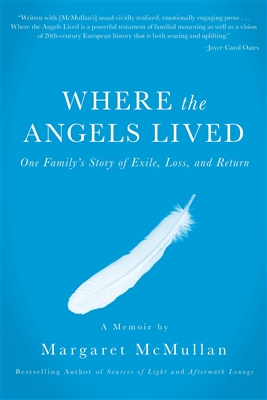By Ellen Ann Fentress. Special to the Clarion-Ledger Sunday print edition (May 5)
Her grandfather, a Catholic University history professor, said he was the last of his accomplished Viennese family. He wasn’t, Mississippi author Margaret McMullan found out in an on-the-ground hunt that took her to Hungary, Austria, and Israel to learn the truth.
McMullan’s grandfather Friedrich Engel, who fled Vienna in 1939, was actually part of a renown—and at the time quite alive— Hungarian Jewish family. The Engel de Janosi clan had presided over their corner of Hungary as an economic and civic power, thanks to flourishing wood and coal enterprises that employed thousands. Emperor Franz-Joseph I of the Austro-Hungarian empire granted nobility to patriarch Adolf Engel and his descendants in 1886 in “recognition of economic virtues.” The family lived in palaces.
 And yet. As Hungary and the citizens of the Engels’ town of Pecs, Hungary were overrun by Nazi forces in 1944, a century of prominence, good works and assumed assimilation weren’t enough for the Engels. The scion of the Pecs branch of the family—McMullan’s grandfather’s first cousin Richard Engel—died at the Mauthausen concentration camp after being rounded up along with other town Jews in March 1944. The story of Richard’s descent from respected, wealthy World War I war hero and city civic leader to being marched off as townspeople watched is the spellbinding story that McMullan tells in Where the Angels Lived: One Family’s Story of Exile, Loss and Return.
And yet. As Hungary and the citizens of the Engels’ town of Pecs, Hungary were overrun by Nazi forces in 1944, a century of prominence, good works and assumed assimilation weren’t enough for the Engels. The scion of the Pecs branch of the family—McMullan’s grandfather’s first cousin Richard Engel—died at the Mauthausen concentration camp after being rounded up along with other town Jews in March 1944. The story of Richard’s descent from respected, wealthy World War I war hero and city civic leader to being marched off as townspeople watched is the spellbinding story that McMullan tells in Where the Angels Lived: One Family’s Story of Exile, Loss and Return.
McMullan has crafted a mesmerizing account not solely of the downfall of her prominent cousin Richard Engel, but also of the shocking transformation of a Hungarian town. Interestingly, residents are now more eager to demonize the past Soviet occupation than to explore any town Nazi complicity in 1944.
McMullan’s has done more than tell this story masterfully. To relay an account of Richard Engel, it was up to her to uncover it. “What is not discovered, what is not saved is lost and forgotten,” she writes. “History is so often written and manipulated by winners. History can’t be written by the dead.”
McMullan came to her project when, out of curiosity, she typed in her family’s Engel de Janosi name at the Yad Vashem Holocaust archive in Jerusalem, when visiting with a writers’ group. The name Richard Engel de Janosi of Pecs, Hungary appeared. The archivist handed McMullan a form called the Page of Testimony. “No one has ever asked about this man, your relative, Richard,” the archivist tells her. “You are responsible now. You must remember him in order to honor him.”
Where the Angels Lived tracks McMullan’s steps from learning of the extensive family history hidden by her grandfather up through her eventual excavation of Richard Engel’s life. Her search benefited from extraordinary persistence and also the serendipity of meeting key people with information to share.
Of course, the memoir’s inevitable look at the gradual nature of totalitarianism’s growth resonates today, as both the U.S. and Hungary experience right-wing resurgences.
To research Richard Engel, McMullan applied to teach at the University of Pecs, which was seeking a lecturer in American literature through the Fulbright academic exchange program. She moves there for a university term in 2010 with her husband Patrick and their eighth-grade son James.
McMullan persists and builds a sense of her cousin Richard through her research. Even the holes in his portrait make him more universal, she reflects. “Maybe I can see Richard more accurately than I can see any other human being,” she writes. Her quest deepened her sense of her own Engels legacy as well. “I feel them at my side as I walk. All this time, they were never very far away.”
Ellen Ann Fentress is a writer, filmmaker and teacher in Jackson.
Margaret McMullan will appear at the Mississippi Book Festival August 17 as a participant in the “Memoir” panel at 1:30 p.m. at the Galloway Fellowship Center.



Comments are closed.